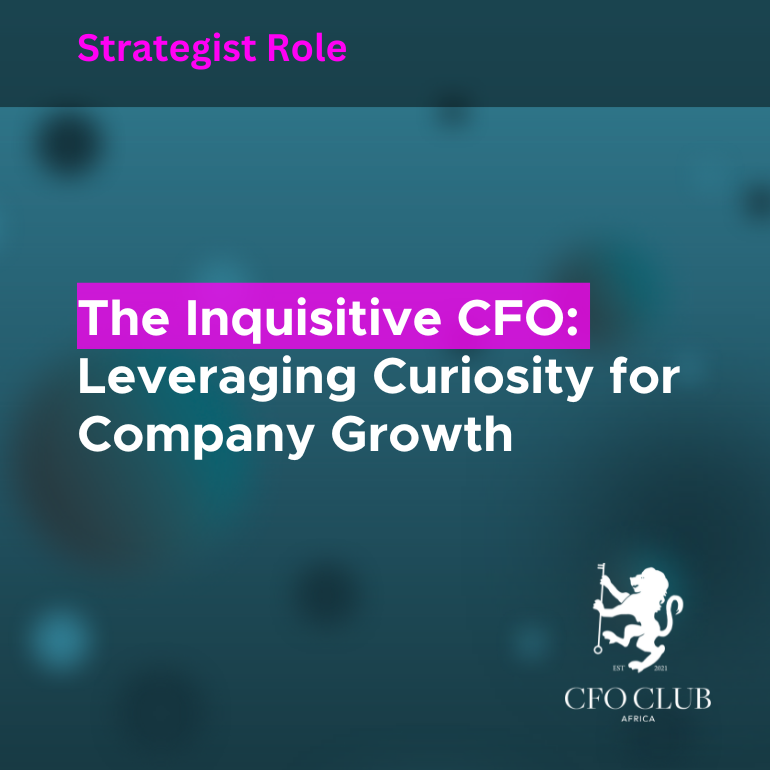The Inquisitive CFO: Leveraging Curiosity for Company Growth
Curiosity is often overlooked as a professional skill. Yet, for a Chief Financial Officer (CFO), curiosity can be a secret weapon to drive company growth. Being inquisitive is not just about asking questions; it’s about fostering a mindset that challenges the status quo, uncovers hidden opportunities, and builds a culture of innovation.
Here’s how curiosity can transform the CFO role and lead to meaningful business growth.
Ask Why, Not Just How
Traditionally, CFOs focus on the “how”—how to manage cash flow, how to meet budgets, or how to achieve targets. While these are critical tasks, they don’t reveal the bigger picture. Asking “why” goes deeper:
- Why are certain products more profitable?
- Why are customers choosing competitors?
- Why is one department consistently overspending?
By digging into the “why,” you uncover insights that can lead to better strategic decisions. For example, a CFO at a retail chain discovered declining profits in a top-performing store. By investigating the “why,” they realised the store was overstocking certain items based on outdated customer preferences. Adjustments led to a significant profit rebound.
Takeaway: Build a habit of asking “why” in meetings, reports, and reviews. Encourage your team to bring data but also to think about its implications.
Challenge Comfortable Assumptions
The phrase “this is how we’ve always done it” can be the death of innovation. As a CFO, you are in a unique position to question these norms. Look at:
- Pricing models: Are they still competitive?
- Supplier relationships: Could renegotiation unlock better terms?
- Financial reporting: Is it telling the full story, or just what’s easy to measure?
When curiosity leads to challenging assumptions, it opens doors to new possibilities. For instance, questioning a long-standing pricing structure might reveal opportunities for subscription-based models that generate recurring revenue.
Takeaway: Regularly review “sacred cows” in the business. Apply a curious lens to areas that have gone unquestioned for years.
Connect Financial Data to Human Behavior
Numbers tell a story, but it’s curiosity that brings the story to life. Look beyond the spreadsheets and think about the people behind them—employees, customers, and stakeholders.
For example:
- If employee turnover is high in a profitable division, what underlying cultural issues might affect future performance?
- If sales in a particular region are spiking, what customer behaviors or external factors are driving this trend?
Curiosity allows you to link financial metrics with real-world dynamics, creating strategies that are not just efficient but also empathetic and sustainable.
Takeaway: Partner with HR, marketing, and operations teams to gain insights into the human side of your financial data.
Experiment with Small Changes
Curiosity thrives in experimentation. Encourage small, controlled changes in processes to see what works better. For instance:
- Test a new financial tool for expense tracking.
- Pilot a flexible payment structure with a small group of customers.
- Adjust working capital cycles in a specific department.
One curious CFO at a manufacturing firm experimented with an AI-driven procurement system in one plant. The result? A 15% reduction in inventory costs without impacting production schedules. This success paved the way for company-wide adoption.
Takeaway: Treat experiments as learning opportunities. Use them to test hypotheses and refine strategies without risking the entire business.
Cultivate a Curious Culture
Your curiosity can inspire the entire organisation. When employees see a CFO who is eager to learn and explore, they are more likely to follow suit. Ways to promote a curious culture include:
- Hosting cross-department brainstorming sessions.
- Encouraging open feedback loops where employees at all levels can voice ideas.
- Recognising and rewarding team members who ask insightful questions.
A curious culture doesn’t just make the CFO’s job easier; it makes the company more adaptable and resilient in the face of change.
Takeaway: Lead by example. Show your team that curiosity is not just welcome—it’s essential.
Leverage Technology to Satisfy Curiosity
Modern CFOs have access to a wealth of tools that can fuel their inquisitive nature. From predictive analytics to real-time dashboards, technology enables deeper dives into data than ever before.
For example:
- Use machine learning to predict future cash flow trends based on historical data.
- Implement visualisation tools to identify anomalies in financial performance.
- Explore customer sentiment analysis to connect financial outcomes with market perception.
These tools don’t replace curiosity; they amplify it by providing faster, clearer answers to your questions.
Takeaway: Stay updated on emerging financial technologies and experiment with tools that align with your goals.
Turn Curiosity into Competitive Advantage
In a world where many CFOs operate on autopilot, curiosity sets you apart. By continuously seeking new insights, you position your company to:
- Spot emerging trends before competitors.
- Adapt faster to market changes.
- Build long-term resilience through informed decision-making.
Consider curiosity not as a personality trait but as a strategic approach. It’s not about having all the answers—it’s about being relentless in asking the right questions.
Final Thoughts: Stay Curious, Stay Ahead
The inquisitive CFO isn’t just a number-cruncher; they’re a visionary who sees beyond the spreadsheets. By embracing curiosity, you unlock new pathways to growth, innovation, and competitive advantage. So, as you tackle your next challenge, ask yourself: What haven’t I questioned yet?
Curiosity may have killed the cat, but for the modern CFO, it’s the key to thriving in business every day.

